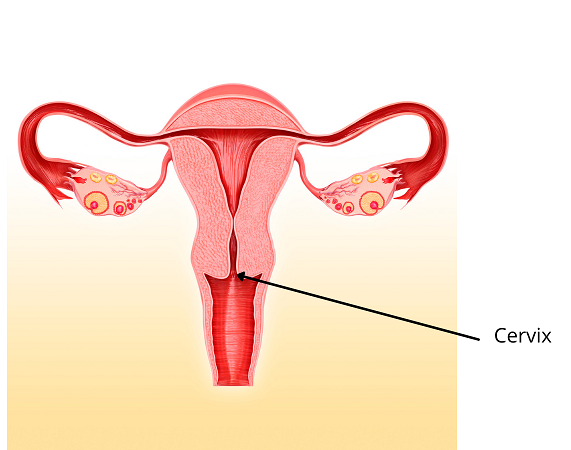Cervical Cancer Prevention and the Importance of Screening
What is cervical cancer?
Cervical cancer is uncontrolled and abnormal growth of cells of the cervix. The cervix is the lowest part of the uterus (womb) and connects the vagina to the uterus. As cervical cancer grows and multiplies, it can invade more areas of the cervix. Eventually spreading to the uterus and surrounding tissues and organs. 
Who is at risk for cervical cancer?
All people who have a cervix are at risk of cervical cancer. People are at an increased risk if they smoke, have a weakened immune system, have multiple sexual partners, or have a history of a high-risk type of human papillomavirus.
What causes cervical cancer?
Most cervical cancers are caused by a virus known as the human papillomavirus (HPV). When the cervix is infected with the virus, cervical cells begin to undergo changes which over time can become cancer. For more information on HPV click HERE.
What is HPV?
HPV is a virus with over 200 types, such as HPV 16 and HPV 18. Some types of HPV cause mild infections while other types can cause cancer. HPV is very common and spreads through skin-to-skin contact. Skin-to-skin contact often occurs during sexual contact. Almost everyone who is sexually active has come into contact with HPV. Most times, the body clears the HPV infection on its own. If the virus is not cleared, it can cause changes in the cells infected, which over time can lead to cancer. Cancer linked to HPV has been found in the cervix, vagina, vulva, anus, mouth, and throat. For more information on HPV click HERE.
How do we screen for cervical cancer?

Your doctor or health care provider can easily screen for cervical cancer during routine pelvic exams. A speculum (a medical tool used to open the vagina) is placed in the vagina to help clearly see the cervix. The cervix is then brushed to collect a small sample of cells, which are sent to a lab for examination. This brushing of the cervix is called a Pap smear (or Pap test). This sample can also be used to test for HPV, the virus that can cause cervical cancer. Not every pelvic exam involves this specific cervical cancer screening test, so it is important to clarify the date of your last Pap smear with your doctor or health care provider.
What can a Pap smear tell me, and why is it important?
Pap smears can diagnose precancerous changes in cervical cells. These changes are typically described as low grade or high grade. People with these changes may require more frequent testing, a biopsy of the cervix (sometimes called “colposcopy”), or treatment to remove the abnormal cells. These changes in cervical cells happen slowly, over several years, so screening allows abnormal cells to be detected and treated before they become cancer.
How often should people be screened for cervical cancer?
According to the United States Preventive Services Task Force (USPSTF), generally, people with a cervix should have a Pap smear with or without an HPV test every 3-5 years:
- Age 21-29: Pap smear every 3 years; no HPV test
- Age 30-65: Pap and HPV test every 5 years (also called “co-testing”), “high-risk HPV test (hrHPV test) every 5 years or Pap smear alone every 3 years
These recommendations do not apply to women who have been diagnosed with a high grade pre-cancer type lesion of the cervix or cervical cancer, or other medical conditions (such as HIV or a weakened immune system or whose mothers took diethylstilbestrol while they were in their mother’s uterus) that may put them at greater risk for developing cervical cancer. People with these risk factors should check with their doctor or health professional to get guidance on what type of screening is needed for them.
When should I stop having Pap smears?
If you are over 65, you can stop having Pap smears if you have no history of high-grade changes or cancer of the cervix, and have had negative results with screenings (three negative Pap smears, or two negative Pap/HPV tests, in the last 10 years) according to joint guidelines issued by the American Cancer Society, American Society for Colposcopy and Cervical Pathology, and American Society for Clinical Pathology Screening.
However, there may be additional circumstances when cervical cancer screening should occur beyond the age of 65. If you have a history of pre-cancerous type lesion, high-grade changes or cancer of the cervix you should discuss with your doctor or health care provider when it is appropriate for you to stop having Pap smears.
If you have had a hysterectomy (surgical removal of the uterus), you should discuss your need to continue Pap smears with your doctor or health care provider. This will depend on whether the cervix was also removed at the time of surgery, whether you have any history of cervical changes or cancer, and why the hysterectomy was performed.
What else can I do to prevent cervical cancer?
The HPV vaccine is one of the best tools to protect against this cancer-causing virus. By priming the body’s ability to fight off the virus, we can avoid HPV infection, and eliminate the primary source of these precancerous changes in cervix. See HPV and Cancer webpage for more information about the HPV vaccine.
In addition to getting the HPV vaccine and regularly screening with Pap smears and HPV tests, practicing safe sex and avoiding smoking can help limit exposure to the virus and strengthen the body’s response to it.
What if I don’t have insurance?
New York State Cancer Services Program (CSP): provides cancer screening to patients without insurance at no cost (https://www.health.ny.gov/diseases/cancer/services/)
Resources to obtain cervical cancer screening in Suffolk County if you are uninsured or under-insured:
For More Information
References
- Cervical Cancer Screening, Frequently Asked Questions. American College of Obstetricians and Gynecologists. Published 2017. Accessed October 2020. https://www.acog.org/patient-resources/faqs/special-procedures/cervical-cancer-screening
- Screening for cervical cancer in resource-rich settings. Updated October 2020. Accessed October 2020. https://www.uptodate.com/contents/screening-for-cervical-cancer-in-resource-rich-settings?search=cervical%20cancer%20screening&source=search_result&selectedTitle=1~106&usage_type=default&display_rank=1
- What Can I Do to Reduce My Risk of Cervical Cancer? Centers for Disease Control and Prevention. Last Reviewed August 2019. Accessed October 2020. https://www.cdc.gov/cancer/cervical/basic_info/prevention.htm
- Saslow, D., Solomon, D., Lawson, H.W., et. al. ACS-ASCCP-ASCP Screening Guidelines. 2012, American Society for Colposcopy and Cervical Pathology Journal of Lower Genital Tract Disease, Volume 16, Number 3, 2012, 00Y00
November 2021